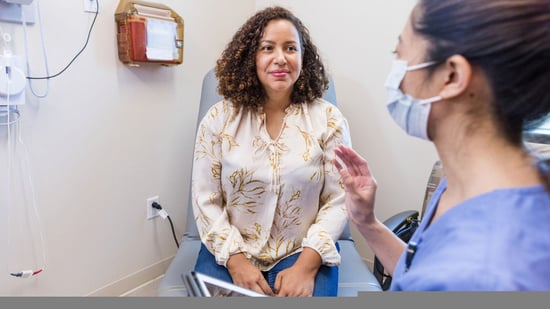How Does Age Actually Impact Your Fertility?
July 15th, 2024 | 4 min. read

Some Ask Monica episodes may contain references to our previous name, RMA of CT. Learn more here.
In this video:
The Relationship Between Age & Fertility
Did you know that age is one of the most common causes of fertility challenges? We’ve all heard about the ol’ biological clock, but what does that REALLY mean for your fertility?
Monica Moore:
Hi everyone. Monica Moore here from Illume Fertility. On this edition of Ask Monica, we are going to talk about age or how does age really impact fertility?
In order to talk about this, we're going to use the whiteboard and discuss why we care about age, why age matters, and what is going on in the body as we age that really affects fertility.
Understanding Cell Division
If we look at a cell, we look at two parts: the cytoplasm and the nucleus.
In the cytoplasm are two structures, the first one is called the mitochondria and it is the energy provider of the cell. Cell division is very hard work. We know this because we can study and look at the amount of energy (or ATP) that needs to be produced in order for proper cell division to take place.
What does the mitochondria do?
The mitochondria is the energy or ATP producer of the cell. As a cell ages, so do all the structures in the cytoplasm, including the mitochondria. So as the mitochondria ages and it's the energy provider for cell division, we can expect then, that as the energy provider, cell division may be negatively impacted. There are also other structures there.
Did you know? In some studies, CoQ10, a supplement, has been shown to positively affect the mitochondria. We often encourage you to take CoQ10 in order to kind of combat this normal aging process.
What is the nucleus?
The other structure is the nucleus, and the nucleus is what contains the chromosomes. Here we have a female with 46 XX chromosomes. With chromosomes, there's cell division of sex cells called meiosis.
Fun fact: Women are born with all of the eggs that they're ever going to have.
Before we're born, meiosis is what's called arrested or paused, in a certain cell state. So, as you age, you then get the green light to resume the process of meiosis. The resumption of meiosis is ovulation, or if we give you something to cause an LH surge, this is prompted by medications such as Ovidrel or hCG.
Here's why all of this matters:
If you're 35, and that particular cohort of eggs that your body "recruits" is 35 years old, it has been arrested (paused) in meiosis for 35 years. So that means it has to wake up, dust itself off, and resume cell division after being stuck in this particular part of meiosis for that long.
You can imagine then that if the chromosomes and the nucleus have been kind of paused for a long time, and then the producer of energy is aging, that cell division might be what's called inefficient.
Age & Chromosomal Abnormalities
If we have a cell and there's meiosis, what we would see is when there's a splitting of the cell, one chromosome goes here and one chromosome goes there. What could happen is, instead, no chromosomes could go here, both chromosomes could go there. This would result in, once it meets with sperm, something called trisomy, or three chromosomes.
Once this meets with sperm, this would result in something called a monosomy. And both of these are what's called aneuploidy or having an abnormal number of chromosomes, which usually is incompatible with life and can cause recurrent implantation failure or pregnancy loss.
Why this matters: What we see in our research is that fertility potential declines and the percent for recurrent implantation failure (not getting pregnant during a cycle, or pregnancy loss) really goes up after age 35.
That's why when we talk to you about being aggressive with cycles, what your treatment cycle is, we really take into account your age as well as all of the testing that we've done for you. The fertility testing process helps us evaluate your ovaries and what's called your ovarian reserve, or the quality and quantity of oocytes (eggs) that you have.
I hope this is helpful. We may need to do a follow-up study with better art on this, but feel free to continue to ask us all of your questions and concerns on this platform. Thanks so much.
Have a question about fertility?
Submit it here and we'll answer it in a future episode of Ask Monica!
Monica Moore is a board-certified Advanced Practice Nurse Practitioner, nurse educator and health coach who has been caring for patients at Illume Fertility for over 20 years. She is also the founder and lead educator at Fertile Health, LLC. Monica is passionate about taking care of the whole patient, believing in the importance of integrating comprehensive care. She has a special interest in PCOS and combating weight bias with education and advocacy.

